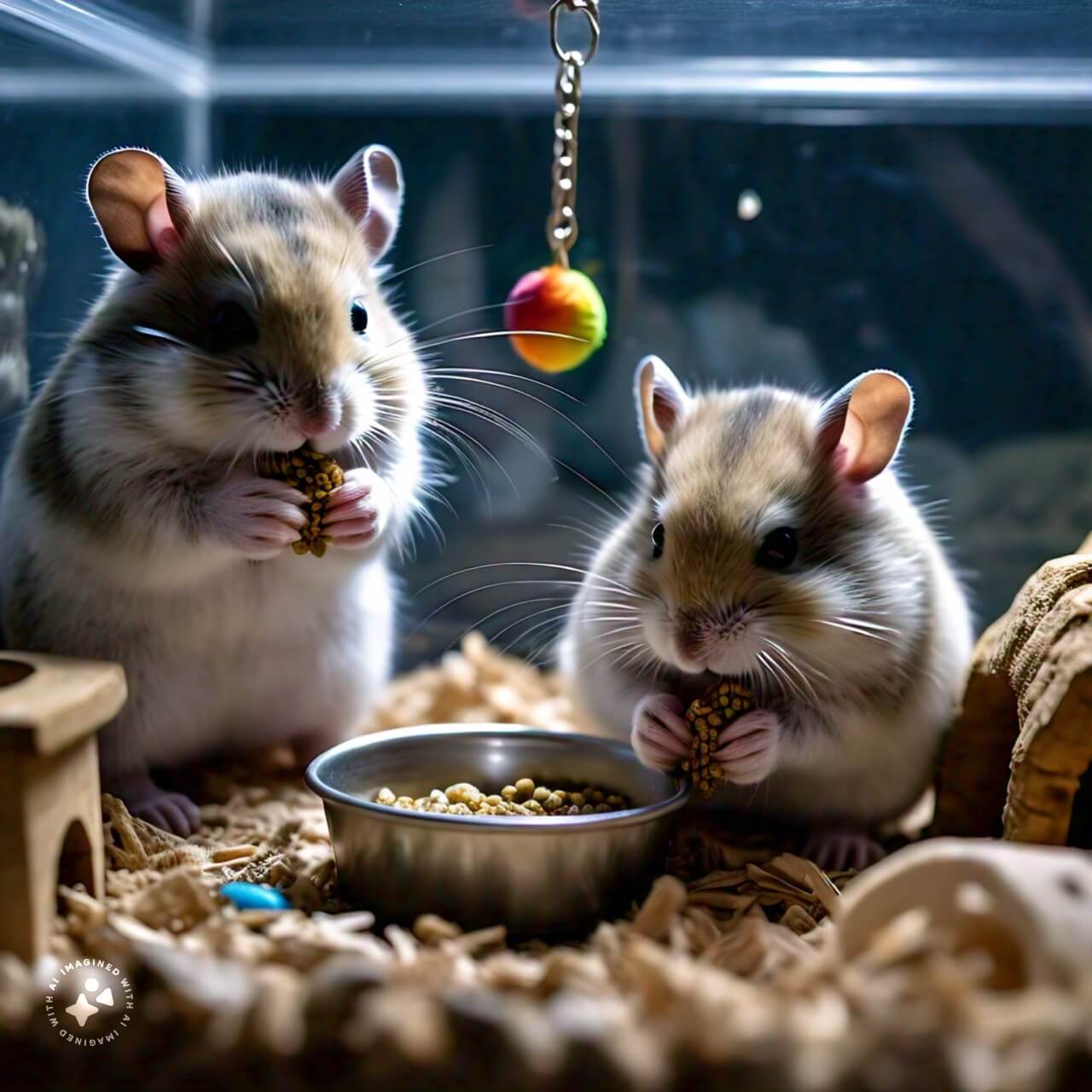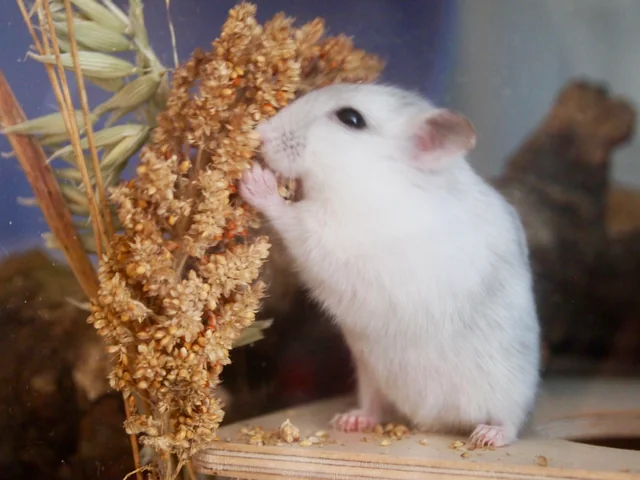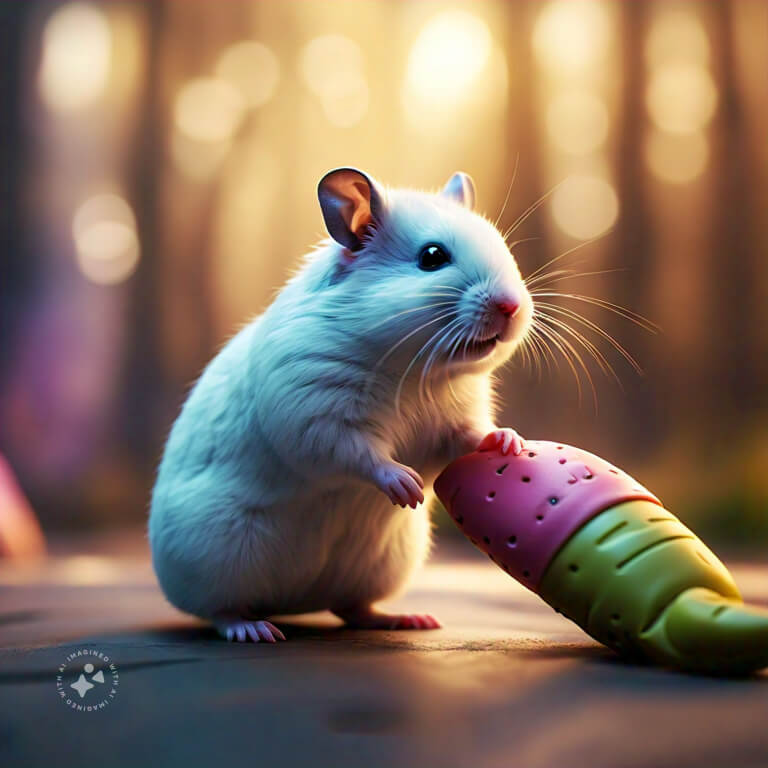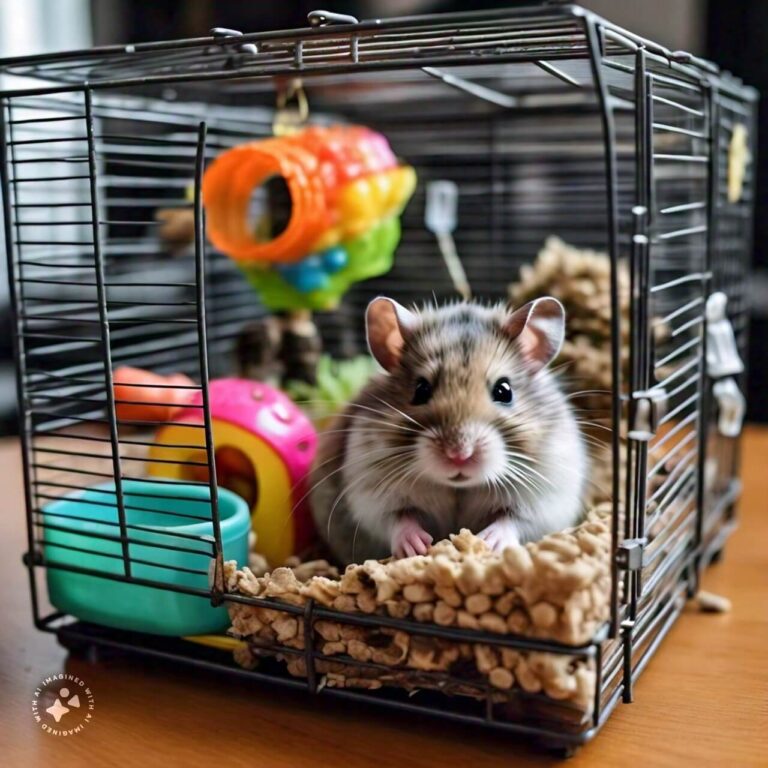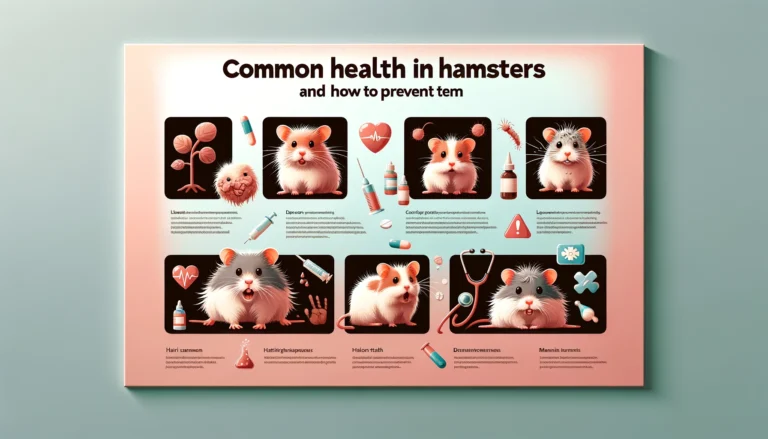Can Hamster Die From Overeating – hamsters.pk
Understanding Hamster Diet: Can Overeating Be Fatal?
Hamsters are delightful pets known for their small size and active nature. However, their dietary needs and the risks associated with overeating are often misunderstood by pet owners. This article will delve into the specifics of hamster diet, the dangers of overeating, and how to ensure your hamster remains healthy and happy.
The Basics of a Hamster’s Diet
A balanced diet is crucial for the well-being of your hamster. Typically, a hamster’s diet should include:
- Commercial hamster pellets: These provide a balanced mix of essential nutrients.
- Fresh vegetables: Carrots, spinach, and broccoli are great options.
- Fruits: Apples and bananas can be given in moderation due to their sugar content.
- Protein sources: Occasionally, boiled eggs or mealworms can be added.
Ensuring a diverse and balanced diet helps in maintaining the hamster’s overall health and prevents nutritional deficiencies.
Why Hamsters Overeat
Hamsters have a natural tendency to hoard food. This behavior, inherited from their wild ancestors, can sometimes lead to overeating if not monitored. Overeating in hamsters can be caused by:
- Boredom: Lack of stimulation and exercise can lead to excessive eating.
- Stress: Changes in environment or routine can make hamsters overeat as a coping mechanism.
- Availability: Unlimited access to food can encourage constant nibbling.
Dangers of Overeating
Overeating can lead to several health issues in hamsters, some of which can be fatal. Key dangers include:
- Obesity: Excess weight can cause mobility issues and increase the risk of diabetes.
- Digestive Problems: Overeating can overwhelm a hamster’s small digestive system, leading to blockages or diarrhea.
- Heart Disease: A high-fat diet and obesity can strain a hamster’s heart.
Understanding these risks is essential for preventing overeating and ensuring a healthy lifestyle for your pet.
Recognizing the Signs of Overeating
Identifying overeating early can help prevent severe health issues. Signs to watch for include:
- Weight Gain: Regularly weigh your hamster to monitor any significant increases.
- Reduced Activity: Overweight hamsters may become less active and playful.
- Large Food Stashes: Frequent checks of your hamster’s habitat for excessive food hoards can indicate overeating.
Preventing Overeating
To keep your hamster healthy, it’s crucial to manage their diet and environment. Here are some tips:
- Controlled Portions: Measure and provide food portions appropriate for your hamster’s size and age.
- Regular Feeding Schedule: Establish a consistent feeding routine to avoid overfeeding.
- Enrichment Activities: Provide toys and exercise wheels to keep your hamster active and mentally stimulated.
What to Do If Your Hamster Overeats
If you suspect your hamster has overeaten, take immediate steps to mitigate the risks:
- Remove Excess Food: Temporarily reduce the amount of food available.
- Monitor Health: Keep an eye on your hamster’s weight and behavior for any changes.
- Consult a Veterinarian: Seek professional advice if you notice signs of obesity or other health issues.
Conclusion
While hamsters can die from overeating, with proper care and attention, this risk can be minimized. Understanding your hamster’s dietary needs, recognizing the signs of overeating, and taking preventive measures are key to ensuring your pet’s longevity and health. By providing a balanced diet and a stimulating environment, you can help your hamster thrive.
Signs and Symptoms of Overeating in Hamsters

Hamsters are small, active creatures that require a balanced diet to maintain their health. However, overfeeding them can lead to serious health issues. It’s important for pet owners to recognize the signs and symptoms of overeating to prevent potential complications. This article will explore the key indicators that your hamster might be consuming too much food and what you can do about it.
Increased Body Weight
One of the most obvious signs of overeating in hamsters is rapid weight gain. Unlike gradual weight gain, which can be normal as hamsters grow, a sudden increase in body weight is a red flag. Regularly weigh your hamster to monitor any significant changes.
Lethargy and Decreased Activity
Hamsters are naturally energetic animals. If you notice your hamster is less active or seems unusually lethargic, it could be due to overeating. Excessive food intake can lead to a lack of energy and motivation to engage in normal activities like running on their wheel or exploring their environment.
Difficulty Breathing
Overeating can cause a hamster to become overweight, which in turn can put pressure on their respiratory system. If your hamster is breathing heavily or seems to have difficulty breathing, this might be a symptom of being overweight due to overeating.
Digestive Issues
Overeating can lead to digestive problems in hamsters. Look for signs such as diarrhea, constipation, or a bloated abdomen. These symptoms can indicate that your hamster’s digestive system is struggling to process the excess food.
Changes in Fur Condition
A hamster’s fur is a good indicator of their overall health. Overeating can cause a decline in fur condition, leading to dullness, patchiness, or even hair loss. A healthy diet is essential for maintaining a shiny and full coat.
Hoarding Excess Food
While hamsters naturally hoard food, excessive hoarding can be a sign of overeating. If your hamster’s food stash is significantly larger than usual, it could indicate they are being given too much food and are storing more than they can eat.
Behavioral Changes
Overeating can lead to behavioral changes in hamsters. They might become more aggressive or irritable due to discomfort or health issues related to their diet. Pay attention to any shifts in your hamster’s normal behavior patterns.
Swollen Feet and Joints
An overweight hamster may develop swollen feet and joints due to the added stress on their tiny bodies. This can make movement painful and difficult, further contributing to their lethargy and decreased activity levels.
Preventive Measures
To prevent overeating, ensure you provide a balanced diet consisting of hamster pellets, fresh fruits, and vegetables in appropriate quantities. Avoid giving them too many high-fat or sugary treats. Regularly clean out their food stash to monitor how much they are eating and consult with a veterinarian for dietary recommendations.
Conclusion
Recognizing the signs and symptoms of overeating in hamsters is crucial for their health and well-being. By being vigilant and providing a balanced diet, you can help prevent the adverse effects of overeating and ensure your hamster remains a happy and healthy pet. If you notice any of the symptoms mentioned above, consult with a veterinarian to address the issue promptly.
Preventing Overeating : Tips for a Healthy Hamster Diet
Hamsters are adorable and relatively low-maintenance pets, but they require proper care to thrive. One crucial aspect of their care is managing their diet to prevent overeating. Overeating can lead to obesity and other health issues, significantly shortening your hamster’s lifespan. Here are some essential tips to ensure your hamster maintains a healthy diet and avoids the dangers of overeating.
Understanding Hamster Nutritional Needs
To prevent overeating, it’s important to understand what constitutes a balanced diet for your hamster. Hamsters require a mix of protein, fiber, and carbohydrates to stay healthy. A typical diet includes:
- Pelleted food: Provides a balanced mix of nutrients.
- Fresh vegetables: Such as carrots, broccoli, and cucumbers.
- Occasional fruits: Given sparingly due to high sugar content.
- Proteins: From sources like cooked egg, mealworms, or small pieces of cooked chicken.
- Fresh water: Always available and changed daily.
Establishing a Feeding Schedule
Creating a consistent feeding schedule helps prevent overeating. Hamsters should be fed:
- Once daily: Typically in the evening, as they are nocturnal and most active at night.
- Measured portions: To avoid excess food that can lead to overeating.
Monitoring Food Intake
Keep an eye on how much your hamster eats. Remove uneaten food before adding new food to prevent your hamster from stockpiling and overeating. This also helps in maintaining the freshness of the food and monitoring their intake more accurately.
Providing Chew Toys and Activities
Hamsters often eat out of boredom. To combat this, ensure your hamster has plenty of chew toys and activities to keep them engaged. This not only helps prevent overeating but also promotes dental health by keeping their teeth worn down.
Avoiding High-Calorie Treats
While treats can be a fun way to bond with your hamster, avoid giving them too many high-calorie treats like sunflower seeds, nuts, or commercial hamster treats. Instead, opt for healthier alternatives like small pieces of fresh fruit or vegetables.
Regular Health Check-Ups
Regular vet check-ups can help monitor your hamster’s weight and overall health. If you notice any significant weight gain, consult your vet for dietary adjustments and further advice.
Conclusion
Preventing overeating in hamsters is crucial for their health and longevity. By understanding their nutritional needs, establishing a consistent feeding schedule, monitoring their food intake, providing plenty of activities, avoiding high-calorie treats, and scheduling regular health check-ups, you can ensure your hamster leads a healthy, happy life. Proper care and attention to their diet can prevent the risks associated with overeating, keeping your furry friend in optimal health.
What to Do if Your Hamster Overeats: Immediate Actions and Long-Term Care
Understanding Overeating in Hamsters
Overeating in hamsters can lead to serious health issues, potentially even death if not addressed promptly. While hamsters are known for their small appetites, they can still overindulge, especially if tempted with highly palatable treats or unlimited food access. This article aims to provide guidance on what to do if your hamster overeats, both in terms of immediate actions and long-term care.
Recognizing the Signs of Overeating
Identifying whether your hamster is overeating is crucial for preventing any further complications. Some signs to watch out for include:
1. Excessive Food Consumption: Observe if your hamster is constantly eating or hoarding food.
2. Weight Gain: Regularly monitor your hamster’s weight to detect any significant increases.
3. Lethargy: Notice if your hamster is less active than usual, which could indicate digestive discomfort.
4. Changes in Feces: Look for diarrhea or abnormal fecal consistency, as these can be indications of dietary issues.
Immediate Actions to Take
1. Remove Access to Food: Immediately remove any remaining food from your hamster’s enclosure to prevent further overeating.
2. Provide Fresh Water: Ensure your hamster has access to clean water at all times to aid digestion and prevent dehydration.
3. Monitor Closely: Keep a close eye on your hamster for the next 24 hours, observing for any worsening symptoms.
4. Contact a Veterinarian: If you notice severe symptoms or if your hamster’s condition does not improve, seek professional veterinary care immediately.
Long-Term Care and Prevention Strategies
1. Balanced Diet: Ensure your hamster is receiving a balanced diet consisting of appropriate amounts of fresh vegetables, pellets, and occasional treats.
2. Portion Control: Measure your hamster’s food portions daily to prevent overeating.
3. Regular Exercise: Provide opportunities for physical activity through exercise wheels and hamster-safe toys to maintain a healthy weight.
4. Health Checkups: Schedule regular checkups with a qualified veterinarian to monitor your hamster’s health and address any concerns promptly.
Conclusion
Overeating can pose serious risks to your hamster’s health, but with prompt action and proper care, you can minimize the chances of complications. By recognizing the signs of overeating, taking immediate actions, and implementing long-term preventive measures, you can ensure your hamster stays happy and healthy for years to come. Remember, vigilance and education are key in providing the best care for your furry friend.


